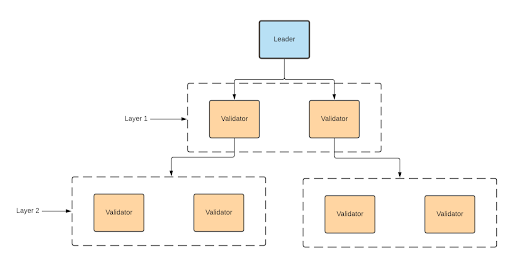How to Become a Solana Validator: Requirements and Steps

By becoming a Solana validator, you get to be part of one of the fastest blockchain ecosystems while earning rewards. Decentralization, network security, and transaction validation in the Solana network are achieved through Solana validators. The article below has everything you need to know regarding becoming a Solana validator, including the benefits, fundamental Solana validator requirements, and how to earn.
With its unique architecture, Solana is a high-performance blockchain featuring incredibly fast transaction speed and low costs. Security and verification are primarily based on the network of validators that secure transactions, and the blocks they form are a key building block of its functionality. Also, being a validator means you can help govern and protect the Solana blockchain and are more likely to earn rewards. Being a validator of the Solana network can be a rewarding opportunity and fun if you are voluntarily inclined and interested in being in the blockchain domain.
#What is a Solana validator?
In short, a Solana validator is a network participant who runs a node in the Solana network, verifies transactions, secures the blockchain, and keeps the distributed ledger up to date. Validators in the Proof of Stake (PoS) model secure the consensus by completing on-chain transactions and creating new blocks. In return, validators receive fees and staking incentives.
Their role in the Solana network is vastly unique:
-
Transaction verification: Validators ascertain that transactions are valid and execute them on the blockchain.
-
Network decurity: Validators contribute to network security by making it highly attack-resistant.
-
Decentralization: Validators contribute to decentralization; the network becomes more resourceful and reliable.
Validators play an essential role in validating the Solana blockchain. They monitor and maintain it in a healthy state, contributing to its soaring throughput.
#Why become a Solana validator?
Below are the core reasons to become a Solana validator:
#Earnings potential
The transaction fees and network rewards distributed to all active validators are used to reward validators. Validators in Solana can increase their income by staking SOL (Solana native cryptocurrency).
#Supporting decentralization
A validator of the Solana blockchain could make a valuable contribution to its decentralization, security, and trustworthiness. Solana's goal is to create a decentralized, permissionless financial infrastructure, so we need validators to make that happen.
#Active participation in blockchain governance
Validators are part of Solana’s governance. They help the network make decisions on upgrades, features, and protocol changes. This role is perfect for people or entities that want to actively participate in Solana's future.
#How to become a Solana validator: Requirements
To become a Solana validator, individuals or organizations must stake a minimum amount of SOL and fulfill certain hardware and software requirements. A validator's votes have greater weight in the consensus process if they have more stakes, either through self-staking or stakes delegated from other token holders.
#Solana validator requirements
Below are Solana validator requirements you need to fulfill to become a validator.
#Hardware and network requirements
CPU:
- 24 physical cores / 48 threads, with a base clock speed of 3.9GHz or faster
- Support for SHA extensions and AVX2 instructions
- Recommended processors: AMD Gen 4 or newer
RAM:
- 384GB DDR5 ECC Registered memory or more
- A motherboard with 1152GB capacity suggested for scalability
Disk:
- OS: 1TB NVMe SSD
- Accounts: 1TB NVMe SSD (PCIe Gen3 x4 or better, with high TBW)
- Ledger: 2x4TB NVMe SSDs (PCIe Gen3 x4 or better, with high TBW)
- Storing accounts and ledger on separate disks is recommended for optimal performance due to high IOPS demands.
Set up your Solana server in minutes
Optimize cost and performance with a pre-configured or custom dedicated bare metal server for blockchain workloads. High uptime, instant 24/7 support, pay in crypto.
#Software requirements
#Install required software
You will need to install and configure the official Solana validator software. This software is responsible for processing transactions, validating blocks, and participating in the consensus mechanism.
#Configure your validator node
- Create the keypairs for your validator and vote accounts
- Link your validator with a vote account
- Set up the node to connect to the desired network
#Stake SOL tokens
To activate your validator, you need to stake SOL tokens:
- Self-stake: Stake a portion of your SOL to activate your validator.
- Attract Delegators: Encourage other SOL holders to delegate their tokens to your validator to increase your total stake weight.
#Technical knowledge
Becoming a Solana validator requires a solid foundation in technical skills and knowledge. Validators are responsible for running critical infrastructure for the Solana blockchain, so understanding the technical aspects ensures reliability, security, and performance. You need to be familiar with concepts like staking, delegations, transaction validation, and block production.
It is great to become a Solana validator because you will help out Solana and earn some rewards at the same time. However, before taking this journey, you must consider the technical and financial requirements.
If you're looking for reliable infrastructure to support your validator setup, explore Cherry Servers' Web3 Infrastructure. With optimized hardware and secure hosting options, it provides the performance needed for high-throughput networks like Solana.
#How much do Solana validators make?
Solana validators earn through the staking rewards and transaction fees. Note: The validator earnings and operational costs can vary significantly based on regional electricity costs, market rates for SOL, and validator uptime.
Let's review the earnings and what the individual validator can make.
#Staking rewards
-
Annual percentage yield (APY): Solana offers 5-6% APY for SOL staked. This percentage is subject to change based on the Solana network's inflation schedule or validator performance. Validators earn rewards proportional to their total stake.
-
Reward distribution: Rewards are distributed among validators and delegators based on their stake percentage. In particular, if a validator has 1% of the total staked SOL on the network, that validator will receive 1% of the total pool of rewards.
-
Commission fee: Validators typically collect a percentage commission fee (almost always between 5% to 10% on the delegator's reward for the services node as an incentive for maintaining and running the node.
For example, with 1,000 SOL staked and 6% APY:
Annual rewards: 1,000 * 6% = 60 SOL If 10% is the commission: 6 SOL (commission) + 54 SOL (delegator reward)
#Transaction fees
While validators earn from transaction fees on the network, given that Solana's fees are sufficiently low (fractions of a cent per transaction), transaction fees remain a mere fraction of validator earnings. On average, at varying transaction volumes, this would add another 1-2 SOL each year.
#Sensible earnings
-
Small validator: A validator with 1000 SOL staked may, on average, earn 55-60 SOL annually, which is currently estimated at $13,000 to $14,000 annually.
-
Larger validator: An established validator with significant stake, around 10000 SOL, can generate several thousand SOL per year, which is equivalent to tens of thousand dollars.
#What would it cost to run a Solana validator node?
Running a Solana validator node involves several costs, mainly split between initial setup costs (hardware) and ongoing operational costs (network and electricity). Here’s a breakdown of the expected expenses:
#Hardware costs
Validator nodes require high-performance hardware to handle Solana’s high transaction throughput. A basic setup typically involves the following components:
-
CPU: A 24-core / 48-thread processor with a base clock of 3.9GHz or higher, such as AMD EPYC Gen 4 or newer, which can cost between $1,500 and $3,000.
-
RAM: At least 384GB of DDR5 ECC Registered RAM is needed for stable performance. With scalability up to 1152GB, RAM costs can range from $2,500 to $5,000, depending on the brand and configuration.
-
Storage: Enterprise-grade NVMe SSDs like the Samsung 970 Pro or PM9A3 can cost $1,000 to $2,000 for the full storage stack.
-
Network connection: A 3 Gbps uplink with 100TB egress and unmetered ingress is recommended. In hosted environments like Cherry Servers, this is bundled with the server plan. For on-premise setups, expect to spend $200 to $500/month on bandwidth.
-
Estimated Hardware Cost: A full validator setup may cost between $5,000 and $10,000 for on-prem deployments. Opting for dedicated hosting providers like Cherry Servers can significantly reduce upfront costs through monthly billing.
#Ongoing operational costs
-
Electricity: Running a high-performance server non-stop has an impact on your wallet. You will shell out $50 to $150, depending on your area's electricity rates.
-
Internet bandwidth: To get a plan with lots of bandwidth, expect to pay $50 to $200 each month.
-
Cloud hosting option (Optional): If you decide to host in the cloud using services like AWS or Google Cloud, be ready to spend $500-$1,500 per month. This price tag comes with a node that meets what Solana needs.
Estimated Monthly Cost: On premise:$100$-$300 and $500$-$1,500 for cloud hosting.
#Staking SOL to start validation
You need to stake a minimum amount of SOL to activate the validator and be eligible for rewards. There’s no minimum, but a substantial stake (at least 100 SOL) does give you more competitiveness since validators with more stakes are preferred for rewards. At current rates, staking around 100 SOL could cost several thousand dollars.
#Software costs
Solana Validator Software: The software is free, but you may need additional software for monitoring, security, and other purposes.
Summary of Costs
Initial setup: $2,500 to $4,000
Monthly operation: $100 to $1,500
Staking SOL: Variable around 100 SOL is typical, costing $23700 depending on the current market rates.
Setting up a Solana validator is a substantial investment, but it can yield returns through staked rewards. The cost can vary depending on the hardware, location, and choice of hosting setup (on-premise vs. cloud).
Also read: What is a blockchain server
#Challenges of Solana validators
Being a Solana validator comes with its challenges, including:
- High operational costs: The hardware requirements are steep, which can be cost-prohibitive for smaller operators.
- Technical complexity: Setting up and maintaining a validator requires technical knowledge and monitoring.
- Network volatility: Rewards may fluctuate with network traffic and SOL token value.
- Security risks: Validators must be vigilant against network attacks, DDoS mitigation, and backups and ensure system security to prevent breaches or downtime. They should also give recommendations for securing private keys.
Validators must be well-prepared for constant monitoring, maintenance, and security demands, especially in such a high-speed network like Solana.
High egress costs and lost transactions?
Switch to blockchain-optimized dedicated bare metal—save up to 60% on your cloud bill and double the performance compared to hyperscale cloud.
#Best Practices for Running a Solana Validator
Here are some recommendations to reach the highest possible factor for efficiency, security, and rewards:
- Regular updates: Update the software to the newest version. This will guarantee that it is protected with recent security patches and performance improvements.
- System monitoring: Use node monitoring tools to help track uptime and performance.
- Securely host your node: Configure firewalls and VPNs and limit access to secure connections and unauthorized connections.
- Engage with the Solana community: Engaging in the validator community exposes you to interaction with network changes, potential upgrades, and problem-solving among validators together.
- Stake enough SOL: Make sure your node has enough SOL staked to boost its ranking for rewards on the network.
Many best practices ensure that the validator runs effectively, provides a secure contribution to the network, and optimizes the source of income.
Also read:Solana vs. Ethereum: Which Blockchain is Better
#Conclusion
A career as a Solana validator allows one to contribute to the blockchain's security, earn rewards, and simultaneously contribute to the network's development. Despite the high start-up and operational costs, earning while participating in blockchain communities can still prove rewarding. The expansion of Solana's ecosystem has only created the demand for reliable validators, making it a very attractive career move for enthusiastic people willing to plunge themselves into the world of blockchain technology.
This guide summarizes how to become a validator on Solana, from set-up to maintenance. Remember to stay in touch with the Solana community and network changes along the way so you can apply the best of your validator set-up.
Set up your Solana server in minutes — Cherry Servers offers pre-built and custom high-performance dedicated bare metal cloud servers for demanding workloads.
Latency from 30ms to 5ms with Cherry Servers
Read how ELSOUL LABO, leading Solana RPC provider, reduced latency from 30 ms to 5 ms with Cherry Servers' high-performance dedicated bare metal, ensuring optimal performance for their users.




